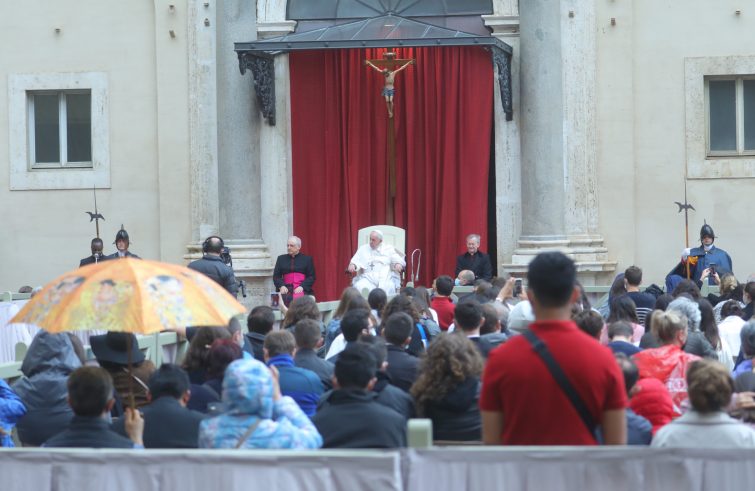
Sloth “is a real temptation against prayer and, more generally, against the Christian life”, the Pope said in the catechesis of today’s audience in the San Damaso Courtyard, devoted the three main difficulties that can emerge to those who pray: distraction, time of bareness, sloth. The latter, Francis said, is “a form of depression due to lax ascetically practice, decreasing vigilance, carelessness of heart. It is one of the seven ‘deadly sins’ because, fuelled by conceit, it can lead to the death of the soul.” “So what can we do in this succession of enthusiasms and discouragements?”, the Pope asked. “One must learn to go forward always”, is the answer.
“True progress in the spiritual life does not consist in multiplying ecstasies, but in being able to persevere in difficult times.
Walk, walk, walk on… and if you are tired, stop a little and then start walking again. But with perseverance.” Saint Francis’ parable on perfect joy offers the key: “it is not in the infinite fortunes rained down from Heaven that the ability of a friar is measured, but in walking steadily, even when one is not recognised, even when one is mistreated, even when everything has lost its initial flavour.” “All the saints have passed through this ‘dark valley’, and let us not be scandalised if, reading their diaries, we find accounts of evenings of listless prayer, lived without enthusiasm”, noted the Holy Father, for whom “we must learn to say: ‘Even though You, my God, seem to be doing everything to make me stop believing in You, I still continue to pray to You’.”
“Barrenness makes us think of Good Friday, at night, and Holy Saturday, all the day: Jesus is not there, He is in the tomb; Jesus is dead, we are alone. And this is the thought that gives rise to barrenness.”
The Pope thus described one of the most frequently encountered obstacles to prayer. Spiritual teachers describe the experience of faith “as a continuous alternation of times of consolation and desolation”, Francis pointed out: “there are times when everything is easy, while others are marked by great heaviness.” The Pope added in unwritten remarks: “Very often we are ‘down’, or rather, we don’t have feelings, we don’t have consolation, we are unable.
They are those grey days … and there are so many of them in life! But the danger is having a grey heart:
when this “feeling down” reaches the heart and it sickens… and there are people who live with a grey heart. The heart must be open and luminous, so that the light of the Lord can enter. And if it does not enter, wait for it, with hope. But do not close it up in greyness.”
“Praying is not easy: many difficulties present themselves in prayer. It is necessary to know them, recognise them and overcome them”,
Francis said in the opening lines of the catechesis: “Prayer often co-exists with distraction. Indeed, the human mind finds it hard to dwell for long on a single thought. We all experience this constant whirlwind of images and illusions in perpetual motion, which accompanies us even during sleep.” The antidote to distraction is vigilance, the Pope said, “a virtue that is often forgotten, but which is so present in the Gospel.” “Jesus often calls the disciples to the duty of a sober life, guided by the thought that sooner or later He will return, like a bridegroom from a wedding or a master from a journey. But since we do not know the day and hour of His return,
all the minutes of our lives are precious and should not be wasted on distractions.”
In fact, believers “never stop praying!” And “it may sometimes resemble the prayer of Job, who does not accept that God treats him unjustly, protests and calls him to judgment.” But, very often, Francis added, “even protesting before God is a way of praying or, as that little old lady said, “being angry with God is a way to pray too.”
“Do not forget the prayer that asks ‘why?’”,
is Francis’, final, unscripted invitation: “It is the prayer of children when they begin not to understand things, which psychologists call ‘the why stage.’”
“At times, getting a bit angry is good for you,
because it reawakens that son-father, daughter-father relationship we must have with God.” Francis said in the closing remarks: “He will accept even our harshest and bitterest expressions with a father’s love, and will consider them as an act of faith, as a prayer.”










